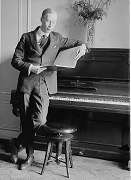The Musical Public Domain in 2024
Thursday, January 25, 2024

If you follow copyright news at all, then chances are you’ve come across the names Walt Disney and Sergei Prokofiev several times already this month. Mickey Mouse and the music to Peter and the Wolf have now entered the public domain—but only depending on where you are in the world.
In law, the phrase “public domain” refers to works without copyright, usually because copyright has expired. This means that people died long enough ago that copyright protection has expired for their works and there is no law prohibiting the use, reuse, publishing, or otherwise building upon their creative ideas. Since copyright varies by country, national laws dictate what has entered the public domain.
Throughout most of Europe and in other countries where copyright expires after the death of the author plus 70 years, the works of composers who died in 1953 are now in the public domain in those countries. Note that this refers to a composer’s music, and other elements of any given creative work that were contributed by other people, such as words that go to a dramatic work, may still be under copyright.
The United States is different: in the US, anything published in 1928 or before is in the public domain there, regardless of date of death. This year’s change in calender puts the earliest rendition of Mickey Mouse in the public domain in the US, even though its creator died in 1966 (and is thus still protected in much of the rest of the world). If you’re not familiar with why a free Mickey has been met with a collective sigh of relief from many corners, read about the saga on the Public Domain Review’s new post about Steamboat Willie.
Potential for confusion is certainly present if a digitized score is found on an American website even though the composer’s works are still under copyright in the European Union. Prominent examples this year include music by Louis Armstrong and Cole Porter: their works from 1928 and earlier are in the public domain in the US but the composers still have copyright protection in the EU. Gradually, works catch up with each other across borders. Kurt Weill entered the public domain in the EU in 2021, but it is only now that the music to his The Threepenny Opera can be legally freely accessed from the United States because it was written in 1928. It is important to be aware of and respect copyright laws, even in the digital environment.
Whether in the EU, the US, or elsewhere, the addition of the 2024 newcomers to the public domain means that libraries and archives have a new slate of composers whose works they can scan and add to their digital collections.
In 2024, we welcome these 59 composers with sources in RISM to the public domain in the EU. If we find out about initiatives to digitize their works, we will of course link to the digital copies in the RISM records. The table can also be viewed and downloaded here.
We’ve been compiling these lists since 2021, but 2024 is the first time that women composers are present. Welcome, Florence Price and Irma von Halácsy!
Further resources:
Image: Prokofieff [i.e. Prokofiev], Bain News Service, between 1918 and 1920. Bain News Service photograph collection, Library of Congress Prints and Photographs Division (cropped). Available online (no known rights restrictions on publication).
Share Tweet EmailCategory: In the news

